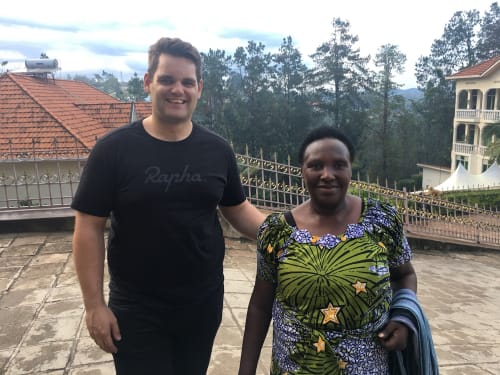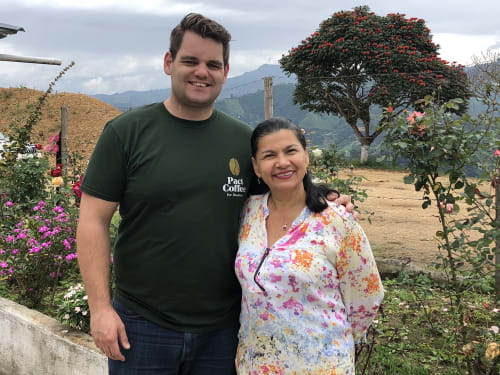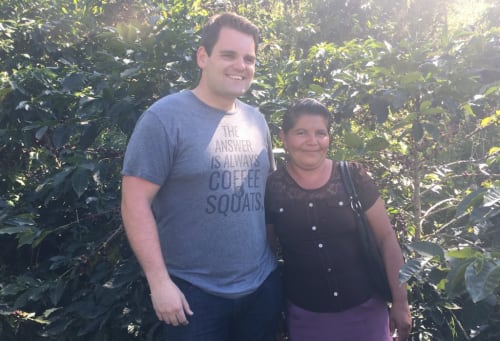This March, Pact dedicated the month to celebrating women in coffee. As you’ll all be aware, current events have meant our focus has had to be elsewhere. That doesn’t mean it’s any less important an issue - so let’s take a moment to review Women in Coffee Month.
What are the issues for women in coffee?
We bang on about the stats a lot, so you’ve probably heard it all before. But if not, here’s three main points to show why we should be supporting women in the coffee industry.
Point 1: Women do a very large amount of coffee farming, and farming generally:
- Women do 70% of physical work on the coffee farm
- Women are 43% of the agricultural workforce, full stop
Point 2: Women don’t get the recognition, support, or resources they deserve:
- Only 15% of farmland, equipment, and crops are owned by women
- Only 5% of relevant coffee farming training goes to women
- Only 25-35% of coffee farms are actually RUN by women
Point 3: Giving women more opportunities and ownership is vital for farming’s future
- Giving women more opportunities could mean a 20-30% rise in production
- “The world economy could add trillions of dollars in growth in the next ten years” if the world raises the proportion of women in the workforce - The McKinsey Global Institute
…I mean, enough said - right?
Our partnership with Hand in Hand International: the total so far!
This March, we’ve been partnering with Hand in Hand International - a charity that’s trying to end poverty by empowering women entrepreneurs. We think they’ve got exactly the right idea about bringing proactive change.
That’s why we donated £1 from every bag bought of the women-grown El Triunfo and Cenicafé 1 Limited Edition coffees we launched this month. And we’re really happy to tell you our donation total is £2,282!
With that figure, Hand in Hand International will be able to change the lives of 41 women through the work they do in Kenya! Thank you so much for your support, Pact Coffee family. There’s a lot going on in the world, but your support will help change things for women living in poverty, all around the world.
Shout-out to some of our favourite women in coffee
We’ve talked all about Cecilia Camacho, who grew Cenicafé 1, and Karla Baquero, who grew El Triunfo - we’ve also reminded you about the incredible Asomuprisma Women’s Association! But there’s a few more Pact favourites that deserve a mention:
- Epiphanie Mukashyaka, Rwanda

If ever we needed an inspiring story, it’s now. Epiphanie’s story is one that’s hard to top. Widowed by the 1994 Rwandan genocide and civil war, she was left with nothing but her late husband’s farm - and with very little knowledge of where to go from there.
But she persevered. She started by selling the small amount of cherries she could grow, and using the money to buy other cherries from farmers nearby. She made sure they got the highest price possible, by grouping the lots and selling them on.
Her struggles were lifted when the Partnership to Enhance Agriculture in Rwanda through Linkages (PEARL) gave her support - helped her improve coffee quality, opening her up to the speciality market. She passed on that knowledge to neighbouring farmers, training them through her new company: Bufcoffee.
Today, the washing stations she’s built process coffee cherries from as many as 7000 small farms in the Bufundo region of Rwanda - she’s the largest employer in the area, and all farms are paid much more than the market rate. What an inspiration!
- Maria del Rosario, Colombia

Maria is married to José Ramone Collazos, and they run Buenos Aires farm together - producing a coffee that’s a firm favourite and mainstay of the Pact Coffee menu. Together, they’ve built a large, thriving farm that pushes coffee quality to the limit… and does so by adequately rewarding their employees.
All farm workers receive comfortable lodgings, three meals a day, social events and even a big Christmas party every year! Not only is that the right way to treat your farm workers, it also means they attract the best talent - meaning quality stays high.
Maria also runs her own farm independently, and is a true figure of authority in their local coffee community.
- Victoria Concepcion Aguirra, Honduras

Victoria started off with just 70 square metres of farmland in Honduras - battling to support her seven children on the small price earned for commodity grade crops. When she heard Pact Coffee was visiting the area, she worked hard to produce a small crop worth of being considered specialty grade - just for us to try!
It showed real potential, and with a little training and guidance, she was able to scale up her production and quality. That meant earning twice as much per harvest, and growing the farm to be three times as big!
Now she’s a local authority on coffee - leading a community-based coffee group, and inspiring other women in coffee to reach new heights. We couldn’t be prouder!
- Nyiramasoni Donatille, Rwanda

Another Rwandan superstar, Nyiramasoni is a stand-out farmer. While the way it generally works over there is by grouping together minuscule crops together - as farmland is limited - her coffee was presented to us as a solitary, isolated lot. And wow, were we glad.
This was not a coffee you’d want to dilute by mixing it with other lots. And after visiting her farm, it became clear there was room for even more improvement - just with a few small changes. We bought her pruning shears, a spray bottle, and a goat(!) for fertiliser, and quality shot straight up!
- Maria Olano, Colombia

So Maria’s not actually a farmer… but she still deserves a shout-out! She’s the Speciality Coffee Buyer for the National Federation of Colombian Coffee Grower’s (FNC) and a big part of why we have the great sourcing relationships we do out there.
She travels far and wide along the winding, mountainous off-track roads of the Colombian hills, visiting farms and sourcing the best quality coffee for us to buy. We couldn’t do what we do without her hard work!







